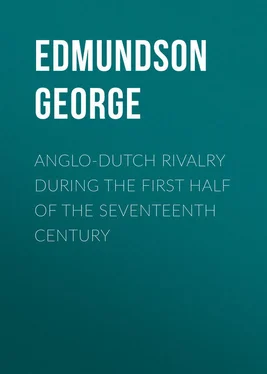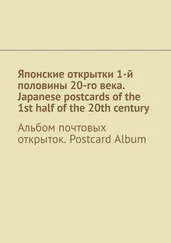George Edmundson - Anglo-Dutch Rivalry during the First Half of the Seventeenth Century
Здесь есть возможность читать онлайн «George Edmundson - Anglo-Dutch Rivalry during the First Half of the Seventeenth Century» — ознакомительный отрывок электронной книги совершенно бесплатно, а после прочтения отрывка купить полную версию. В некоторых случаях можно слушать аудио, скачать через торрент в формате fb2 и присутствует краткое содержание. Жанр: foreign_antique, foreign_prose, на английском языке. Описание произведения, (предисловие) а так же отзывы посетителей доступны на портале библиотеки ЛибКат.
- Название:Anglo-Dutch Rivalry during the First Half of the Seventeenth Century
- Автор:
- Жанр:
- Год:неизвестен
- ISBN:нет данных
- Рейтинг книги:4 / 5. Голосов: 1
-
Избранное:Добавить в избранное
- Отзывы:
-
Ваша оценка:
- 80
- 1
- 2
- 3
- 4
- 5
Anglo-Dutch Rivalry during the First Half of the Seventeenth Century: краткое содержание, описание и аннотация
Предлагаем к чтению аннотацию, описание, краткое содержание или предисловие (зависит от того, что написал сам автор книги «Anglo-Dutch Rivalry during the First Half of the Seventeenth Century»). Если вы не нашли необходимую информацию о книге — напишите в комментариях, мы постараемся отыскать её.
Anglo-Dutch Rivalry during the First Half of the Seventeenth Century — читать онлайн ознакомительный отрывок
Ниже представлен текст книги, разбитый по страницам. Система сохранения места последней прочитанной страницы, позволяет с удобством читать онлайн бесплатно книгу «Anglo-Dutch Rivalry during the First Half of the Seventeenth Century», без необходимости каждый раз заново искать на чём Вы остановились. Поставьте закладку, и сможете в любой момент перейти на страницу, на которой закончили чтение.
Интервал:
Закладка:
The question at issue was of vital consequence to the Dutch. It may be asserted without any exaggeration that the commerce and prosperity of Holland and Zeeland had been built upon the herring fishery, and rested upon it. The discovering of the art of curing the herring by Willem Beukelsz at the close of the fourteenth century had transformed a perishable article of local consumption into a commodity for traffic and exchange. Soon the 'great fishery', as it was called, afforded, directly or indirectly, occupation and a means of livelihood to a large part of the entire population of the Province of Holland. 7 7 The Zeelanders in the seventeenth century, though they sent out many fishermen to the Dogger Bank, to Greenland and Spitzbergen, did not take much part in the herring fishery. See note.
Not only did many thousands of Hollanders put out to sea to follow the track of the herring shoals along the British coasts, but thousands more found employment on shore in building the busses, pinks, and other boats engaged in the lucrative industry, and in providing them with ropes, nets, and other necessaries. The profit from the fishery alone before the outbreak of the revolt was estimated by Guicciardini at 500,000 Flemish pounds. But such an estimate was far from representing the real value of what was styled by the States-General in an official document 'one of the chiefest mines of the United Netherlands'. 8 8 Groot Placaet-Boek (July 19, 1606).
Salt was required for the curing. It was brought in Dutch bottoms in its rough state from French and Spanish ports, or direct from Punta del Rey on the coast of Venezuela, and salt-refineries quickly sprang up at Enkhuysen, Hoorn, and other fishing centres. In a land which had no natural products, the cured herrings and the refined salt which were not required for home use served as articles of commerce, and freights were dispatched to the neighbouring lands but specially to the Baltic to be exchanged for corn, timber, hemp, and other 'Eastland' commodities. The enterprising Hollanders and Zeelanders, at first competed with the Hanse towns in the Baltic ports, but long before the opening of the seventeenth century had practically driven their rivals from the field, and at the time with which we are dealing it has been computed that no less than 3,000 Dutch vessels were engaged in the 'Eastland' traffic through the Sound. The corn in its turn brought by so vast a fleet far more than sufficed even for the needs of a country where no corn was grown. Some thousands of other ships laden with grain voyaged along the coast of France, the Peninsula and the Western Mediterranean, discharging their cargoes and returning with freights of wine, silk, olive oil, and other staple products of the South. The Spaniards and Portuguese were in fact largely dependent upon the Hollanders for their necessary food supplies, and these keen traders had no scruples in enriching themselves at the cost of their foes. An abundance of timber and hemp also came from the Baltic and furnished the raw material for flourishing shipbuilding and ropemaking industries. Sawmills sprang up on the banks of the Zaan, and before long Zaandam became the chief centre of the timber trade of Europe. It will thus be seen at once how many Dutch interests were involved in the full maintenance of the rights to free fishing on the British coasts guaranteed by treaty, and why it was that the States-General under pressure from the States of Holland should have determined to send a special embassy to protest strongly and firmly against the edict of King James, and should have meantime promised the fishermen their protection in case of any attempt being made to compel them by armed force to pay the licences.
The step taken by King James had, however, from the English point of view much to recommend it. The English people saw the growing maritime strength and rapidly increasing commercial prosperity of the Dutch with jealous eyes. Their practical monopoly of the British fisheries was deeply resented. Pamphlets were written lamenting the decadence of English shipping and trade. 9 9 A Pollitique Platt , by Robert Hitchcock, 1580. Observations made upon the Dutch fishery about the year 1601 , by John Keymer. Ralegh, Works , i. 144. Sir Thomas Overbury's observations in his travels in 1609: Harleian Misc. viii. 349. Discourse addressed to the King by Sir Nicholas Hales, on the benefit derived by the Dutch from English fisheries. Terms suggested for granting them a licence to fish for twenty-one years. Calendar of State Papers, Dom. Ser., 1603-10 , p. 509.
It was felt that the ancient claim of England to the sovereignty and dominion of the narrow seas was being challenged, and that its maintenance depended upon the numbers and the experience of the sea-faring population, for whom the fisheries were the best and most practical school. A petition is extant from the fishermen of the Cinque Ports to the King, showing that the Netherlanders drive them from their fishing, and sell fresh fish contrary to the laws, and beseeching His Majesty to impose on them a tax of fifteen shillings upon every last of fish, the same as they imposed on the English. 10 10 Cal. State Papers, Dom. Ser., 1603-10 , p. 509.
James was far from indisposed to listen to their complaints. Early in his reign, in 1604, an attempt had been made to enforce the eating of fish in England on fast-days, and the motive of it was plainly stated. It had little to do with religious observances. It was 'for the better increase of Seamen, to be readie at all times to serve in the Kings Majesties Navie, of which the fishermen of England have euer been the chiefest Seminarie and Nurserie.' 11 11 Statutes of the Realm , iv. 2, p. 1058.
The suggestion that licences should be required for which a tax or toll should be paid naturally presented itself to the King, at this time in sore straits for money and at his wit's end how to obtain it, as a welcome expedient. It also afforded a means by which the sovereignty and jurisdiction of the British King in the British seas could be asserted and his regalities safeguarded. 12 12 Letter of Salisbury to Cornwallis, June 8, 1609. Winwood's State Papers , iii. 44-50.
The large revenue derived by Christian IV of Denmark from the tolls in the Sound had no doubt often made the impecunious James envious of his brother-in-law, whose right to levy such an import in Danish waters differed in no way from the right, which as King of Great Britain and Ireland he was now asserting, to demand a licence from all foreigners who desired to fish on the British coasts. His decision to issue the proclamation was confirmed by the appearance in March, 1609, of the famous treatise of Hugo Grotius, entitled Mare Liberum . The argument in this work seemed to be directed against the principle of a dominium maris such as the English Kings had claimed for centuries in the 'narrow seas', and its publication at this time aroused the resentment of James, always tenaciously jealous of any infringement of his sovereign prerogatives. As a matter of fact, as has been shown by the late Professor Robert Fruin 13 13 Fruin's Verspreide Geschriften , vol. iii, pp. 408-45.
, the Mare Liberum was originally a chapter of a larger unpublished work of Grotius, written to prove that the Portuguese had no exclusive rights in the Indian Ocean but that the Eastern seas and all others were open to the traders of every nation. The most burning question in the negotiations for the twelve years' truce, then just drawing to a close, had been that of the liberty to trade in the Indies, demanded with insistence by the Dutch, refused up to the very last peremptorily by the Spanish King, and conceded by him finally not directly but by a kind of subterfuge. The Mare Liberum of Grotius saw the light at a time when it was hoped that his learned arguments might tend to allay the acuteness of the dispute by showing the reasonableness and legality of the position taken up by the Dutch. It is clear now that these arguments, though their application was general, had their special reference to Portuguese and not to British pretensions. Curiously enough, as will be seen later, it was in the long succession of Anglo-Dutch negotiations over the fisheries in the seas over which the Crown of England claimed paramount sovereignty and jurisdiction that the thesis put forward by the author of the Mare Liberum was destined to be the source of embittered controversy. The acute mind of King James was quick in grasping its importance.
Интервал:
Закладка:
Похожие книги на «Anglo-Dutch Rivalry during the First Half of the Seventeenth Century»
Представляем Вашему вниманию похожие книги на «Anglo-Dutch Rivalry during the First Half of the Seventeenth Century» списком для выбора. Мы отобрали схожую по названию и смыслу литературу в надежде предоставить читателям больше вариантов отыскать новые, интересные, ещё непрочитанные произведения.
Обсуждение, отзывы о книге «Anglo-Dutch Rivalry during the First Half of the Seventeenth Century» и просто собственные мнения читателей. Оставьте ваши комментарии, напишите, что Вы думаете о произведении, его смысле или главных героях. Укажите что конкретно понравилось, а что нет, и почему Вы так считаете.












